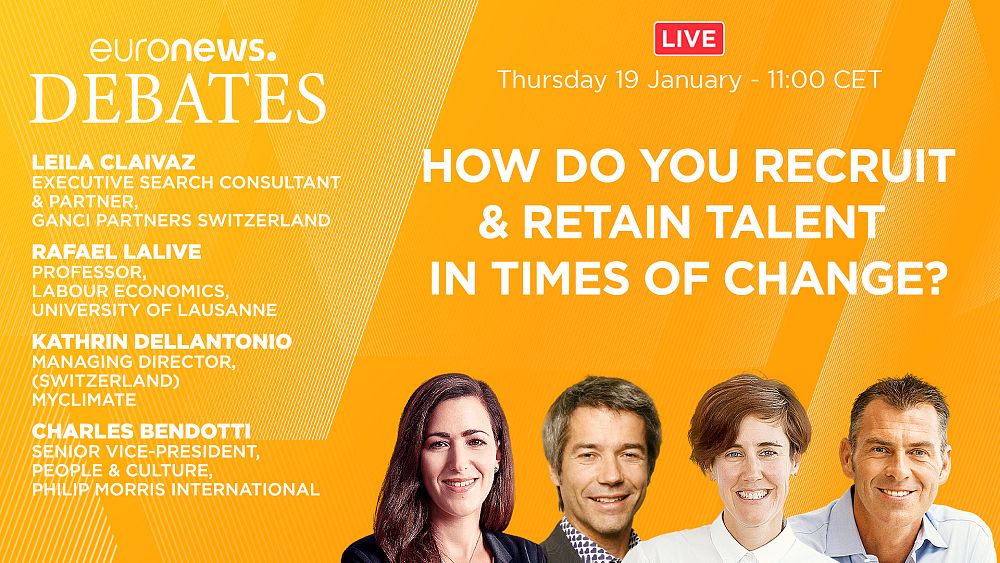
One of the key themes to emerge from the COVID-19 pandemic in the world of work has been the challenge for businesses in recruiting and retaining talent.
With lockdowns and restrictions forcing companies to adapt and implement flexible working policies as a necessity, workers got a taste of what was possible.
Companies are having to race to adapt to the demands of this new workforce, which is hungry for flexibility and better working conditions.
Now hybrid working has emerged as a clear legacy from firms being forced to adopt work from home policies almost overnight during the pandemic.
But is this enough for the new post-pandemic worker? Individuals are increasingly scrutinising employers over things like their carbon footprint, sustainability commitments, corporate and social responsibility, and diversity.
Euronews brought together a panel of experts to discuss these issues.
You can watch the full debate back in the video player above. Here’s the cutdown version:
The panel started off with their general impressions of the current labour market, with one key theme emerging – the difficulty in hiring the right candidate for open positions following the disruption of the COVID-19 pandemic.
According to Rafael Lalive, professor of Applied Economics and Econometrics at the University of Lausanne, the pandemic caused a “big wave of layoffs”, but once the jobs were needed to be filled once again, many workers had reassessed what they wanted to do in their careers, leaving a shortage of workers in specific industries such as travel and tourism.
Kathrin Dellantonio, the Managing Director of myclimate Switzerland, a carbon protection consultancy, said her industry faced the opposite problem – there was a lot of interest in her organisation from jobseekers, although that came with stiff competition from other similar organisations. “Just offering a trendy topic like sustainability is not enough anymore,” she said.
For Leila Claivaz, Executive Search Consultant and Partner at Ganci Partners, more and more companies are struggling to find the right candidate. “It’s now a candidate’s market,” she explained, where strong candidates have the choice of companies to work for, and they are “more and more selective”, asking for more from potential employers such as flexibility and company values.

‘Drastic impact’ of pandemic
The pandemic was an “impediment” for many companies, but not his, said Charles Bendotti, Senior Vice President People & Culture at Philip Morris International. The global tobacco company has embraced a mission of a “smoke-free world” he said, and along with this mission change, the company made it clear its people would come first during the pandemic, which helped to retain and recruit talent.
Specifically Philip Morris took a “middle ground” on flexibility, he explained. “It had a drastic impact on our policies and our mindset. We were a very traditional company before the pandemic, allowing one day a week working from home.” Now they have a policy of two days in the office, with workers allowed to work from home three days a week should they choose.
Kathrin Dellantonio agreed that having some physical interaction is needed, but said “the challenge is to find a good compromise, and think carefully, where does it make sense to come to the office”.
For executive candidates, Leila Claivaz said “it’s all about flexibility now”. “It’s their first question. In the past it was salary and benefits, but now flexibility is the main expectation they have”.
Rafael Lalive explained there seems to be a “huge shift” from workers prioritising salaries to aspects such as flexibility, sense and purpose. He gave the example of a bookseller operating in Geneva and Lausanne who had adopted a four-day week with no salary sacrifice. He explained he was building a long-term relationship with his knowledgeable and effective team of staff, and was successful in retaining them, which was the goal.
Shift in power dynamic
“Hiring now is like a seduction,” said Claivaz. When she first started in her field jobs were posted and candidates got in touch, a system that no longer works. “A company in Germany is paying candidates when they upload their CV, then when they come for an interview they receive more money, and when they pass the assessment they receive more money, and when they sign the contract they receive more.”
This reflects how companies are fighting between themselves to attract the best candidates at the executive level, she said.
Bendotti agrees the dynamic has changed with hiring, but he said “seduction” is a word “I would be very careful with”.
“If you do stuff to seduce a candidate and you don’t deliver on the promise, then you will generate chaos and massive turnover,” he said. Claivaz agreed, clarifying: “You need to seduce with the truth”.
For Bendotti the biggest change is that the idea of an interview has turned into a conversation. “It’s not me trying to drill the person, and prove to me how good you are. Today it’s more a balance act of having a dialogue with the person. You don’t only want to attract the best talent, but make sure that talent flourishes and enjoys the place.”
Dellantonio agreed it is difficult now to find the best people – and to keep them. So how do our experts advise on finding the best talent for roles?
Lalive said through his research he has seen recruiters are much more willing to compromise during a tight labour market, “which tells us recruiters are desperate”.
“We are not desperate yet!” was Claivaz’s response. She insisted the tight labour market is where recruiters can do their best and most important work. Bendotti is “absolutely convinced” that 80 per cent of the hiring solutions are within an organisation’s current workforce, where there should be a focus on retaining and developing talent.
And the idea of finding the perfect candidate from the outside for a specific role is perhaps not the best way of looking at it, according to Dellantonio. The “second best solution” often turned out to be the best, hiring a candidate who was able to quickly build up the necessary knowledge they perhaps didn’t have when they first joined. “The challenge nowadays in the recruitment process is to find out the potential the person has to get into the topic very fast and build up the knowledge necessary to deliver the job.”
Looking for purpose at work
The panel agreed that the hunt for work with purpose has accelerated over the past few years, and not just due to the pandemic. Lalive explained he has seen two generations of job seekers during his studies. The first was focused on getting a job – almost any job. The current generation however contains many more who specifically want their work to have a positive impact on the world.
“Diversity, purpose, sustainability, these are things they care about,” he said. “That’s what we also see in politics, activism, there’s a whole movement we see in the younger generation today.”
Bendotti pointed out that “big social events” such as the #MeToo movement and Black Lives Matter have accelerated this search for purpose. But he also argued it is not only reflected in the younger generation. “I’m 50, I have kids, and for me the purpose of a company, sustainability and inclusion, diversity, that all matters as much to me as it does to my kids.”
Dellantonio agreed that meaningful work requirement is linked not to the younger generation, but “the times we are living in”. “We have employees starting from a little above 20 years of age to above 60. We see that for all of them, a very important reason is a meaningful job.”
And this brings up the question of balancing the requirement for meaningful work with competitive salary. Dellantonio admits NGOs like hers cannot compete with the salaries of the banking sector, but she insists her organisation has developed so that it can compete with the salaries in many other sectors. “If we couldn’t compete with them, it would be very difficult to find good people,” she said.
“There are people who value a high salary more than others, and there are people who value purpose more than salary,” said Lalive. “By offering a specific package you’re communicating what it is you’re doing, and you’re attracting people who are going to be happy in that environment.”

Recruiting in five to 10 years
Asked what the landscape will look like in five to 10 years, the panel pinpointed some key themes. One of those Bendotti and Claivaz hoped to see was a rise of shared jobs. Calling for more exchange of talent between companies, Bendotti said there are growing numbers of people who want more than one job, or to balance their one job with other commitments.
The issue of artificial intelligence was also raised by Claivaz and Bendotti, who said it would play a bigger and bigger part in talent recruitment in the future. “We need to make sure the machine doesn’t take over,” insisted Bendotti, but he pointed out AI could do a lot of the work of narrowing down candidates for roles before the human takes control of the process.
And for Kathrin Dellantonio, working your network will only become more crucial as we move into the future. She also pointed out that companies are going to have to be quick to snap up talent – “if it takes weeks or months, the best people will have gone.”.
Our panel consisted of:
Rafael Lalive
A professor of Applied Economics and Econometrics at the University of Lausanne, Rafael Lalive obtained a PhD in Economics from the University of Zurich in 2001. His research focuses on social economics, labour economics, public economics and microeconometrics.
His main area of research in the area of the labour market is the effects of public policies on individual behaviour, while he also studies the effects of family policies on labour market participation, fertility, and behavioural outcomes for children.
Kathrin Dellantonio
Born and raised in South Tyrol, Kathrin Dellantonio is the Managing Director of myclimate Switzerland, a leading provider of carbon protection consulting and a key player in corporate climate strategy.
She holds a masters in political science from the University of Vienna and Aix-en-Provence, and prior to joining myclimate Switzerland she worked with WWF Switzerland and WWF International
Leila Claivaz
Leila Claivaz is an Executive Search Consultant & Partner at Ganci Partners. She joined the Swiss leading Executive Search firm with a long experience in recruitment in Switzerland in the luxury, watchmaking and technical sectors. She started in executive search, before building in-house teams of recruiters and sourcers. During her time with the SBB (Swiss Railways) team in Romandie she won the digital HR award in 2020. Since then, she has been a member of the award’s organising committee.
Claivaz holds a Master’s degree from the University of Lausanne and a Certificate of Advanced Studies in Human Resources from the University of Geneva.
Charles Bendotti
Currently Senior Vice President People & Culture at Philip Morris International, Bendotti joined the company in Lausanne in 1999 as a business analyst. He then served in various cross-functional roles in Marketing & Sales and Business Development, before being appointed Vice President, Human Resources for the Latin America & Canada Region in 2008.
In 2012, he was named Vice President, Human Resources Asia, a position he held until December 2016, and then Senior Vice President, Human Resources. Bendotti holds a Master’s degree in International Relations, Economy, and Law from the Graduate Institute of International & Development Studies in Geneva, Switzerland, and an Executive MBA from HEC Paris.

